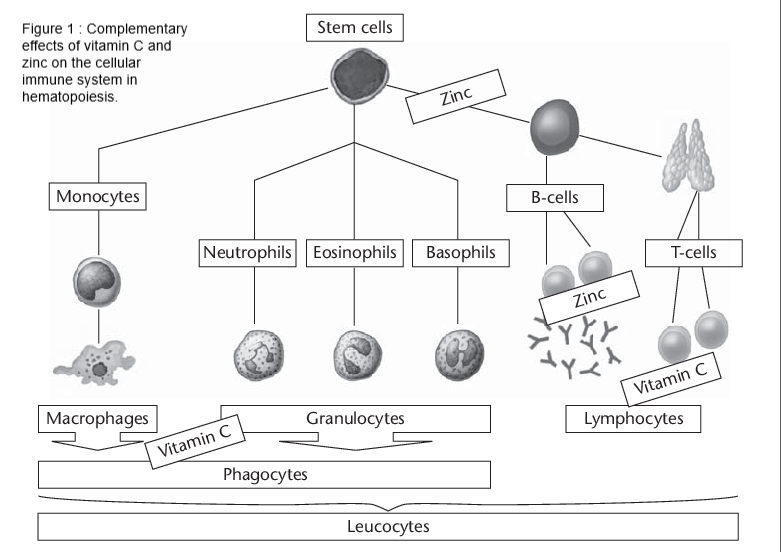Vitamin C is a water-soluble vitamin that is absolutely essential for the normal metabolic functions of our body. Besides its biological functions, vitamin C is also implicated in the strengthening of the immune system and the stimulation of leucocyte functions. A deficiency in vitamin C affects various components including delayed – type hypersensitivity, which could eventually lead to a compromised immune system.
The immune system is a multifaceted and sophisticated network of specialized tissues, organs, cells, proteins and chemicals, including free radicals, which has evolved in order to protect the host from a range of dangerous pathogens and foreign substances.
Our immune system can be classified into epithelial barriers, cellular and humoral constituents of innate immunity or specific immunity, as well as into organs such as lymph nodes, gut-associated lymphoid tissue, spleen, bone marrow and the lymphatic system. These components interact with our nutrients in multiple and highly complex ways and networks.
Vitamin C, for example, supports the functions of innate immunity such through its antioxidant properties and its role in collagen synthesis, which is required for the stabilization of epithelial barriers. It has an immunostimulatory effect, which it does by improving the functioning of phagocytes, the proliferation of T-lymphocytes and the production of interferon, in addition to decreasing the replication of viruses within the body.
The high concentration of leucocytes and phagocytes in vitamin C are used rapidly to fight against acute and chronic infections and diseases. Its high antioxidant activity counteracts the extremely high levels of oxidative stress that follow the actions of reactive oxygen species (ROS) released by phagocytes and oxidative burst of macrophages that kills pathogens.
High supplemental intakes of vitamin C can stimulate phagocytic and T lymphocytic activities while showing marked improvements in several components of human immune response such as antimicrobial and natural killer cell activities, lymphocytes proliferation, chemotaxis and delayed type hypersensitivity.

Figure 1 : Complementary effects of vitamin C and zinc on the cellular immune system in hematopoiesis.
DOSAGE OF VITAMIN C FOR GENERAL MAINTENACE:
The metabolism of vitamin C is regulated by several mechanisms. Generally, small intakes are conserved, while larger amounts can be tolerated without ill effects. That said, the absorption of vitamin C is most efficient when taken in low dosage. At larger dosage, the absorption rate of the vitamin becomes less efficient, with a significant amount of it being excreted out from the body through urine.
The ideal dosage for vitamin C is around 30 – 180mg per intake, which typically allows for 70 – 90% absorption rate. Consuming more than 1000mg will decrease the absorption rate to 50%.
ROLES OF VITAMIN C IN MANAGEMENT OF COVID-19:
A major complication of COVID-19 is respiratory infection, which arises from lung injuries caused by hyperactivation immune effector cells. Acute respiratory tract infections can lead to serious, life-threatening conditions such as severe pneumonia and bronchiolitis.
Vitamin C is a major antioxidant that is present in the airway surface fluid of the lungs. Its immunostimulatory and antiviral properties helps the body resist various viral and bacterial infections, which helps in improving the symptoms of respiratory infection.
Ingestions and pneumonia have been shown to lead to reduced vitamin C levels in plasma, leukocytes and urine, implying that vitamin C administration may have a beneficial effect on patients with these ailments. Administration of 6g of vitamin C per day helps to abolish the deficiency of the vitamin induced by common cold. Hence, a sufficiently high dose of vitamin C could be a safe and beneficial choice of treatment in the early stages of COVID-19.
According to US nutritional recommendations, the tolerable upper intake level is stated to be 2g daily for adults. The basis for this upper limit is the apparent side-effect of developing diarrhea at higher vitamin C intakes. That said, although there have been concerns and speculations regarding the potential harmful effects of large doses of vitamin C, they have been shown to be largely unproven. Furthermore, it has been stated that patients with pneumonia can take up to 100 g of vitamin C daily without developing diarrhea, possibly because of the changes in vitamin C metabolism caused by the severe infection.
The concern that may arise with high-dose vitamin C treatment is osmotic cell death of immune cells, but not apoptosis, which could generate a local inflammation in alveolar medium. Therefore, IV glucocorticoid treatment must be added to attenuate the possible inflammatory complications of high-dose vitamin C treatment.
On that note, the recommended treatment regimen for high-dose intravenous vitamin C is administration of 50 mg/ per kilogram body weight every 6 hours for 4 days with a glucose restriction. In addition, hydrocortisone 50 mg IV for every 6 hours for 7 days must be added to fight against therapy-induced inflammation.
Vitamin C when used as a parenteral agent in high doses may act pleiotropically as a prooxidant to attenuate pro-inflammatory mediator expression, improving alveolar fluid clearance, and acts as an antioxidant to improve epithelial cell functions.
REFERENCES:
1. Hemilä H. Ph.D. Thesis. University of Helsinki; Helsinki, Finland: 2006.
2. Englard S., Seifter S. The biochemical functions of ascorbic acid.
3. Robertson E.C. The vitamins and resistance to infection: Vitamin C
4. Clausen S.W. The influence of nutrition upon resistance to infection.
5. Bartley W., Krebs H.A., O’Brien J.R.P. Vitamin C Requirement of Human Adults.
6. Peterhans E. Oxidants and antioxidants in viral diseases
7. Hume R., Weyers E. Changes in leucocyte ascorbic acid during the common cold.
8. Mochalkin N.I. Ascorbic acid in the complex therapy of acute pneumonia.
9. Hemilä H., Louhiala P. Vitamin C for preventing and treating pneumonia
10. Hemilä H., Louhiala P. Vitamin C may affect lung infections.
11. Pauling L. Ascorbic acid and the common cold.
12. Karlowski T.R., Chalmers T.C., Frenkel L.D., Kapikian A.Z., Lewis T.L., Lynch J.M. Ascorbic acid for the common cold: A prophylactic and therapeutic trial.
13. Padayatty SJ, Sun H, Wang Y, et al. Vitamin C pharmacokinetics: implications for oral and intravenous use.
14. Maggini, S., Wenzlaff, S., & Hornig, D. (2010). Essential Role of Vitamin C and Zinc in Child Immunity and Health.
15. Erol, Adnan. (2020). High-dose intravenous vitamin C treatment for COVID-19. 10.31219/osf.io/p7ex8.



Comments are closed.